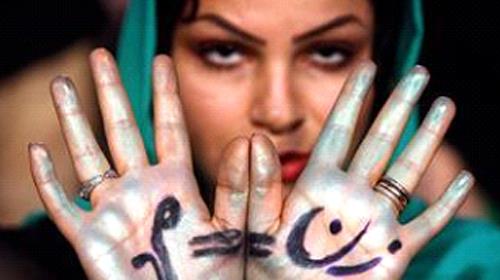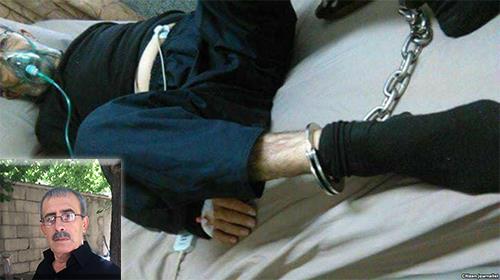Iran: Where the regime opposes women’s rights
woman in iran with women should have same rights as men on her hands
Every year, the day November 25 comes as a grim reminder that we have a long way to go for achieving gender parity. There are still many countries in the world where women cannot fully exercise the right to shape their own destiny. Violence against women is another detestable vestige of the mostly patriarchal societies inherited by our generation.
It may seem that we have come a long way since the Dark Ages, but there are still some countries in the world that have made little progress in according equal rights to women and men. There is even a country where misogyny is the order of the day and where women have no legal rights.
It may come as a shock to many, but Iran continues to run in this way. The Iranian regime may keep up pretences in public on issues related to women’s rights, but in practice women remain second class citizens in that country.

The violence led to chatter on social networks that there had been up to 13 acid attacks against women drivers
Subhuman treatment of women
It is not difficult to prove that Iranian theocrats are opposed to the idea of gender equality. Iran’s Supreme Leader Ali Khamenei has been quoted as saying: “Gender equality is ‘Zionist plot’ aimed at corrupting the role of women in society.” In Iran’s version of religious law, women are considered property.
Their inheritance is half of what men receive and women are not allowed to leave the country without their husband’s consent. They are also forced to observe a very strict dress code. There are several security measures in place in Iran to impose these laws. The most repressive one is the infamous ‘morality police’ that roams around cities arresting young women for not observing the dress code.
There are gruesome videos on YouTube and other social media showing how women are treated in Iran for what they wear. In a recent incident, a 14-year-old girl was beaten and detained for wearing ripped jeans in Iran (one of many such cases of police brutality against women). After her arrest by Islamic Revolutionary Guard Coups (IRGC) unit, she said: “I still carry the bruises sustained from their beatings on my face ... my ribs still hurt.
Women in Iran are also banned from entering sports stadiums. In a recently reported case by Human Rights Watch (HRW), a woman named Mina tried to get under the radar of security forces to watch a volleyball match in 2016. Despite her attempt to watch the match from the roof top of a café near a volleyball stadium, she and a few other women were caught by IRGC and were evicted from their vantage point.
Irrespective of their position in society, women in Iran have no right to travel without the consent of their husband or father. Hassan Rouhani and his predecessor Mahmoud Ahmadinejad had once made bogus promises of giving women more rights in order to garner their votes. In May this year, Rouhani had spread the word that he might appoint a women minster in his cabinet. But soon after his sham election he did not include any woman in his cabinet.
Iranian women defy repression
However, Iranian women seize every opportunity to show their resistance against their ill-treatment by the regime. After Khamenei’s ridiculous fatwa banning women from riding a bike in public last year, women in Iran came out in droves riding their bikes in defiance. According to the state-run media, Khamenei issued a decree on 10 September 2016 wherein he said: “Riding a bicycle often attracts the attention of men and exposes the society to corruption, and as contravenes women’s chastity so it must be abandoned”.
Since the first day of the installation of the regime, Iranian women have resisted their attempts at oppression. Back in the day, Iran like other countries of the Middle East could hardly imagine any role for women other than staying at home and taking care of children.
One woman took the lead in this struggle for freedom which was no longer about just freeing Iranian women but the entire Iranian society, which was taken hostage by the regime. Maryam Rajavi, president of the National Council of Resistance of Iran (NCRI), an educated woman has done the impossible and instilled thousands of Iranian men and women with the idea that all citizens in the country can struggle for a common cause: Freedom.
She has proven through her leadership role that the same deprived and underprivileged woman is no different than her male counterpart in struggling for a free and democratic society. She has built a blueprint for building a better Iran with her 10-point plan, wherein women are deemed fully equal to men in all spheres of social activity.
There would be no limits for women in this new Iran. Filling the highest political positions will no longer be just a dream for women. The Mujahedin-e Khalq (MEK) — the biggest Iranian opposition group and a member of the NCRI — has followed her teachings for years and is now led by her.
Violence against women in Iran is institutionalized simply because half of the society is treated as crippled and in need of guidance from men; be it the male head of the family or males in the state itself. Thus, the status of women will never change in Iran as long as the present regime is in power.
Disclaimer: The views and opinions expressed in this article are those of the authors and do not reflect the viewpoint of Al Arabiya English.
Reza Shafiee (@shafiee_shafiee) is a member of the Foreign Affairs Committee of the National Council of Resistance of Iran (NCRI).




Comments
Post a Comment